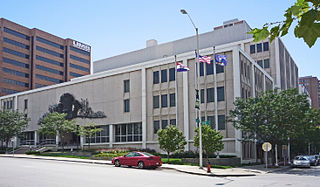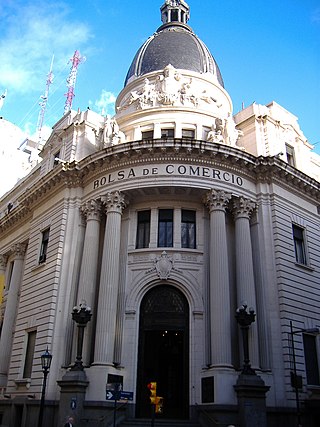
A commodity market is a market that trades in the primary economic sector rather than manufactured products, such as cocoa, fruit and sugar. Hard commodities are mined, such as gold and oil. Futures contracts are the oldest way of investing in commodities. Commodity markets can include physical trading and derivatives trading using spot prices, forwards, futures, and options on futures. Farmers have used a simple form of derivative trading in the commodity market for centuries for price risk management.
A futures exchange or futures market is a central financial exchange where people can trade standardized futures contracts defined by the exchange. Futures contracts are derivatives contracts to buy or sell specific quantities of a commodity or financial instrument at a specified price with delivery set at a specified time in the future. Futures exchanges provide physical or electronic trading venues, details of standardized contracts, market and price data, clearing houses, exchange self-regulations, margin mechanisms, settlement procedures, delivery times, delivery procedures and other services to foster trading in futures contracts. Futures exchanges can be organized as non-profit member-owned organizations or as for-profit organizations. Futures exchanges can be integrated under the same brand name or organization with other types of exchanges, such as stock markets, options markets, and bond markets. Non-profit member-owned futures exchanges benefit their members, who earn commissions and revenue acting as brokers or market makers. For-profit futures exchanges earn most of their revenue from trading and clearing fees.

The Chicago Mercantile Exchange (CME) is a global derivatives marketplace based in Chicago and located at 20 S. Wacker Drive. The CME was founded in 1898 as the Chicago Butter and Egg Board, an agricultural commodities exchange. For most of its history, the exchange was in the then common form of a non-profit organization, owned by members of the exchange. The Merc demutualized in November 2000, went public in December 2002, and merged with the Chicago Board of Trade in July 2007 to become a designated contract market of the CME Group Inc., which operates both markets. The chairman and chief executive officer of CME Group is Terrence A. Duffy, Bryan Durkin is president. On August 18, 2008, shareholders approved a merger with the New York Mercantile Exchange (NYMEX) and COMEX. CME, CBOT, NYMEX, and COMEX are now markets owned by CME Group. After the merger, the value of the CME quadrupled in a two-year span, with a market cap of over $25 billion.

The Chicago Board of Trade (CBOT), established on April 3, 1848, is one of the world's oldest futures and options exchanges. On July 12, 2007, the CBOT merged with the Chicago Mercantile Exchange (CME) to form CME Group. CBOT and three other exchanges now operate as designated contract markets (DCM) of the CME Group.

The New York Mercantile Exchange (NYMEX) is a commodity futures exchange owned and operated by CME Group of Chicago. NYMEX is located at One North End Avenue in Brookfield Place in the Battery Park City section of Manhattan, New York City.

The Commodity Futures Trading Commission (CFTC) is an independent agency of the US government created in 1974 that regulates the U.S. derivatives markets, which includes futures, swaps, and certain kinds of options.

The London International Financial Futures and Options Exchange was a futures exchange based in London. In 2014, following a series of takeovers, LIFFE became part of Intercontinental Exchange, and was renamed ICE Futures Europe.
The Brampton Board of Trade is a business organization founded in Brampton, Ontario, in 1887. It engages in government lobbying, member discounts, and networking. It previously organized the Brampton Santa Claus Parade (1985-2017).
ICE Futures Canada (IFCA)—known as the Winnipeg Commodity Exchange (WCE) until 2008—was a derivatives market based in Winnipeg, Manitoba, and was Canada's only commodity futures exchange.

The Kansas City Board of Trade (KCBT), was an American commodity futures and options exchange regulated by the Commodity Futures Trading Commission. Specializing in the hard-red winter wheat contract, it was located at 4800 Main Street in Kansas City, Missouri.

The Minneapolis Grain Exchange (MGEX) is a commodities and futures exchange of grain products. It was formed in 1881 in Minneapolis, Minnesota, United States as a regional cash marketplace to promote fair trade and to prevent trade abuses in wheat, oats and corn. MGEX became a subsidiary of Miami International Holdings after the two companies merged in 2020.
A commodity broker is a firm or an individual who executes orders to buy or sell commodity contracts on behalf of the clients and charges them a commission. A firm or individual who trades for his own account is called a trader. Commodity contracts include futures, options, and similar financial derivatives. Clients who trade commodity contracts are either hedgers using the derivatives markets to manage risk, or speculators who are willing to assume that risk from hedgers in hopes of a profit.
The Toronto Region Board of Trade is the principal local business community organization in the City of Toronto. It is the largest Chamber of Commerce/board of trade in Canada and one of the largest in North America. Its primary contemporary focus is to advocate for policy change that drives the growth and competitiveness of the Toronto region on members' behalf. Its stated objective is to make the Toronto region one of the most competitive and sought-after business regions in the world. It offers business services, educational programing, facilities, and events to its members, and policy advices and analysis to the governments of the City of Toronto, the Province of Ontario, and Canada, and various public organizations and agencies. It develops and promotes policies and programs under the key strategic pillars of trade, transportation and talent. It operates at its office in First Canadian Place in Toronto's financial district.

The Rosario Board of Trade is a non-profit making association based in Rosario, in the Province of Santa Fe, Argentina. Founded on August 18, 1884, it serves as a forum for the conduct of trade negotiations in several markets including grain, oilseed, agricultural products and their by-products, as well as securities and other assets.
Vincent W. Kosuga was an American onion farmer and commodity trader best known for manipulating the onion futures market. Public outcry over his practices led to the passing of the Onion Futures Act, which banned the trading of futures contracts on onions.
Everette Bagby Harris, was an American businessman. Harris served as President of the Chicago Mercantile Exchange from 1953 to 1978. During this time, he oversaw the diversification of the products traded on the exchange. He was previously the secretary of the Chicago Board of Trade.
Jerry W. Markham is a professor at the Florida International University College of Law, and a legal scholar on business organizations and securities regulation in the United States.

Richard L. Sandor is an American businessman, economist, and entrepreneur. He is chairman and CEO of the American Financial Exchange (AFX) established in 2015, which is an electronic exchange for direct interbank/financial institution lending and borrowing. The AFX flagship product, the AMERIBOR benchmark index, reflects the actual borrowing costs of thousands of regional and community banks across the U.S. and is one of the short-term borrowing rates, along with the Secured Overnight Financing Rate, vying to replace U.S. dollar Libor as a benchmark in the U.S.
A commodity trading advisor (CTA) is US financial regulatory term for an individual or organization who is retained by a fund or individual client to provide advice and services related to trading in futures contracts, commodity options and/or swaps. They are responsible for the trading within managed futures accounts. The definition of CTA may also apply to investment advisors for hedge funds and private funds including mutual funds and exchange-traded funds in certain cases. CTAs are generally regulated by the United States federal government through registration with the Commodity Futures Trading Commission (CFTC) and membership of the National Futures Association (NFA).









